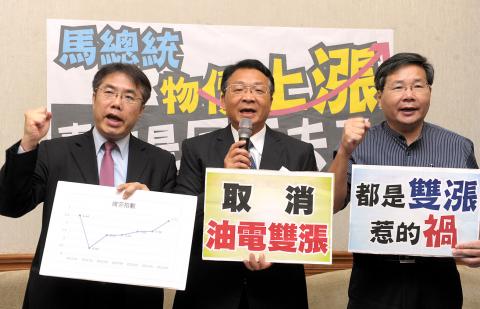President Ma Ying-jeou (馬英九) should suspend an electricity price hike planned for December to ease the public’s financial burden and carry out plans to improve state-run power companies as he had promised, lawmakers of the pan-green camp said yesterday.
Citing the huge losses of Taiwan Power Corp (Taipower), the Ma administration heeded the public’s complaints and revised the original one-off price increase plan in May to a three-stage increase, with a 40 percent rate hikes for the first stage beginning on June 10 and another 40 percent increase on Dec. 10.
The first electricity price increase, coupled with the rising price of fuel, triggered a general rise in the prices of commodities and made people’s lives harder, Democratic Progressive Party (DPP) Legislator Chen Ou-po (陳歐珀) told a press conference.

Photo: CNA
The “misery index,” the sum of the unemployment rate and the inflation rate, is now at 6.77 and would likely rise when the second-stage increase takes effect, said Chen, who initiated the proposal to call for the hike to be suspended.
Taiwan Solidarity Union (TSU) caucus whip Hsu Chung-hsin (許忠信) said the implementation of the second increase would be unwise because average monthly real wages are now on the same level as 17 years ago and 3.6 million Taiwanese young people earn less than NT$30,000 (US$1,004) per month.
The reason Taipower gave for raising electricity rates — that it was suffering huge losses due to perennially low fuel prices — “is now illegitimate,” DPP Legislator Chen Ting-fei (陳亭妃) said in a separate press conference organized by the DPP legislative caucus.
It was illegitimate “because it [Taipower] had allocated a large amount of bonuses in its budget plan for next year and it was unable to cut the price that it paid for electricity it purchases from independent power producers [IPPs] as it had promised,” Chen said.
The company allocated NT$164 million for bonuses and NT$3.2 billion in welfare funds in its budget statement for next year, while its personnel expenses were just NT$34.8 billion, DPP Legislator Huang Wei-cher (黃偉哲) told the press conference.
This was not consistent with Taipower’s pledge in an initial report conducted by a task force organized by the Ministry of Economic Affairs (MOEA) to improve its management, in which the company said it would be able to save between NT$2.1 billion and NT$2.6 billion in costs by purchasing electricity from IPPs at cheaper rates, Huang said.
“Judging from the budget statement, it seems to me that the company lacks the willingness to implement reforms,” Huang said.
Huang said the proposal to suspend the second stage of the hike plan has been met with consensus across party lines, despite the Chinese Nationalist Party (KMT) caucus being pressured by Ma to stick to the plan.
Taipower’s budget for this year is stalled in the legislature, he said, adding that its budget for next year is not likely to be approved either.

A preclearance service to facilitate entry for people traveling to select airports in Japan would be available from Thursday next week to Feb. 25 at Taiwan Taoyuan International Airport, Taoyuan International Airport Corp (TIAC) said on Tuesday. The service was first made available to Taiwanese travelers throughout the winter vacation of 2024 and during the Lunar New Year holiday. In addition to flights to the Japanese cities of Hakodate, Asahikawa, Akita, Sendai, Niigata, Okayama, Takamatsu, Kumamoto and Kagoshima, the service would be available to travelers to Kobe and Oita. The service can be accessed by passengers of 15 flight routes operated by

Alain Robert, known as the "French Spider-Man," praised Alex Honnold as exceptionally well-prepared after the US climber completed a free solo ascent of Taipei 101 yesterday. Robert said Honnold's ascent of the 508m-tall skyscraper in just more than one-and-a-half hours without using safety ropes or equipment was a remarkable achievement. "This is my life," he said in an interview conducted in French, adding that he liked the feeling of being "on the edge of danger." The 63-year-old Frenchman climbed Taipei 101 using ropes in December 2004, taking about four hours to reach the top. On a one-to-10 scale of difficulty, Robert said Taipei 101

MORE FALL: An investigation into one of Xi’s key cronies, part of a broader ‘anti-corruption’ drive, indicates that he might have a deep distrust in the military, an expert said China’s latest military purge underscores systemic risks in its shift from collective leadership to sole rule under Chinese President Xi Jinping (習近平), and could disrupt its chain of command and military capabilities, a national security official said yesterday. If decisionmaking within the Chinese Communist Party has become “irrational” under one-man rule, the Taiwan Strait and the regional situation must be approached with extreme caution, given unforeseen risks, they added. The anonymous official made the remarks as China’s Central Military Commission Vice Chairman Zhang Youxia (張又俠) and Joint Staff Department Chief of Staff Liu Zhenli (劉振立) were reportedly being investigated for suspected “serious

Taiwanese and US defense groups are collaborating to introduce deployable, semi-autonomous manufacturing systems for drones and components in a boost to the nation’s supply chain resilience. Taiwan’s G-Tech Optroelectronics Corp subsidiary GTOC and the US’ Aerkomm Inc on Friday announced an agreement with fellow US-based Firestorm Lab to adopt the latter’s xCell, a technology featuring 3D printers fitted in 6.1m container units. The systems enable aerial platforms and parts to be produced in high volumes from dispersed nodes capable of rapid redeployment, to minimize the risk of enemy strikes and to meet field requirements, they said. Firestorm chief technology officer Ian Muceus said